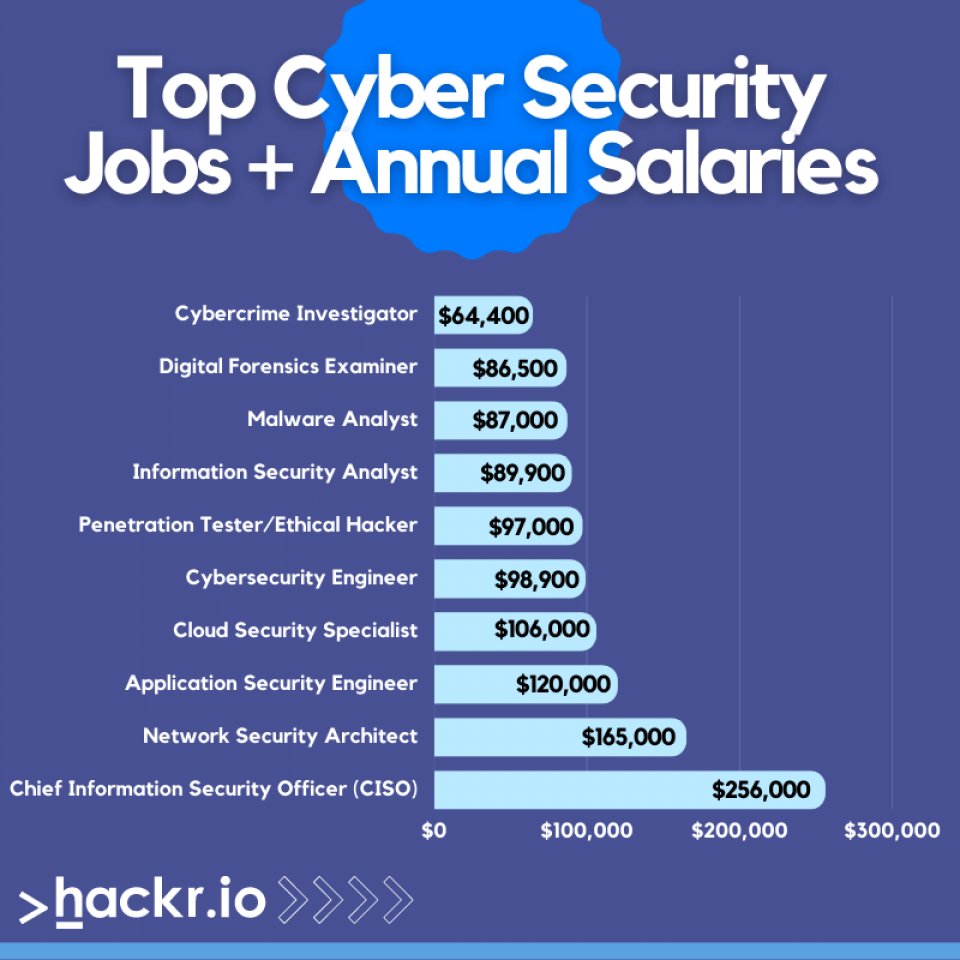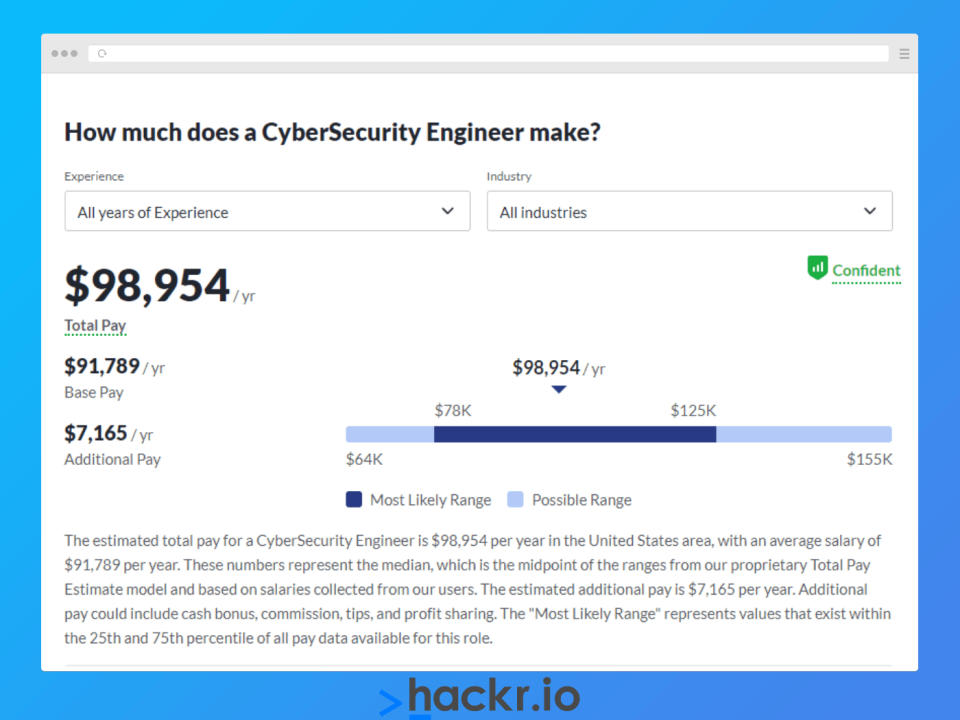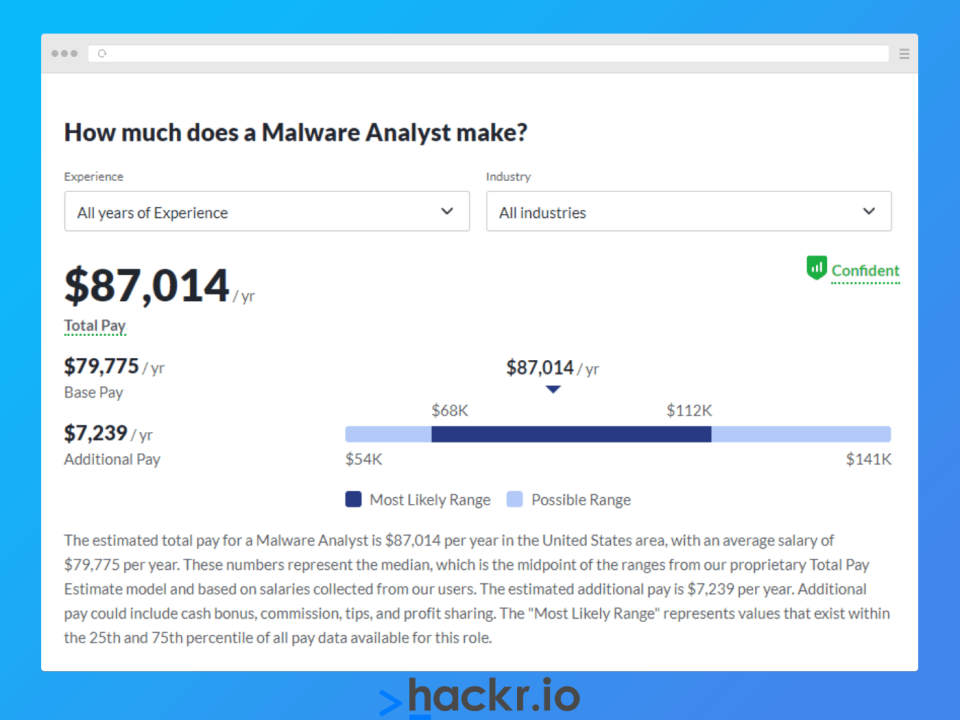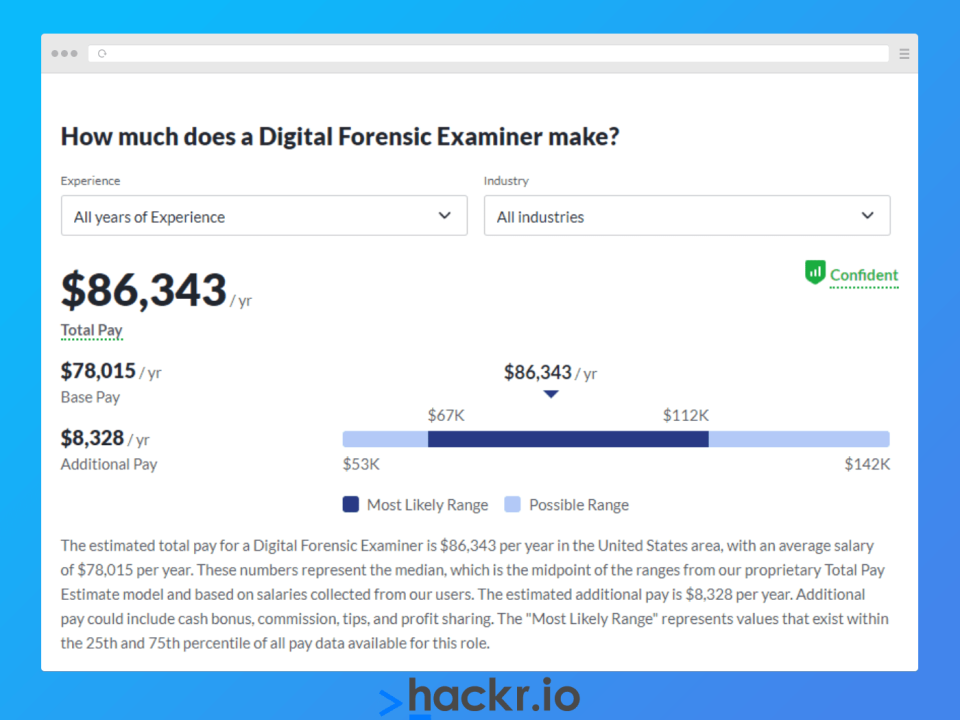As we continue to move forward in the digital industry, the threats and risks present are also increasing. The problem is that there’s a lack of trained professionals that can handle these issues. And this puts skilled people in cyber security in high demand.
In this article, we’ll explore the current trends in the cyber security industry, the benefits of having a related job, and the best cyber security jobs you can consider in 2024.
What’s Going On in the Current Cyber Security Industry?
Last year's cybersecurity space saw an increase in black hat attacks that involve advanced threats like ransomware, Internet-of-Things (IoT) vulnerabilities, and those driven by artificial intelligence (AI).
But these problems are only three of the many cyber concerns there are. Attacks on automotive APIs rose by a massive 380% in 2022, even when preventive measures and fortified cybersecurity protection have been employed.
Cloud security is also a major concern, especially with an increasing number of businesses moving their data and operations to the cloud. As a result, data breaches in the first six months of 2022 were rampant, with 817 incidents affecting more than 53 million individuals.
According to the 2021 Internet Crime Report of the Federal Bureau of Investigation (FBI), cybercrime victims lost about $6.9 billion. The said report also cited 3,729 complaints related to ransomware and over 11,000 cases of phishing.
The Bureau of Labor Statistics forecasted employment in the cybersecurity industry to grow by 35% from 2021 to 2031. With cyber threats becoming more sophisticated, skilled professionals who can catch and respond to them effectively are in high demand.
Related Course:
Cyber Security: From Beginner to Expert
Benefits of a Career in Cyber Security
With cybersecurity as one of the most crucial industries in the world, there are a lot of benefits you can get when you enter a related career. For one, there are low chances of you getting unemployed (unless you choose to), given the high and still growing need for experts.
Here are other advantages of getting a cybersecurity job.
Competitive Salary
As with any other market, the value of something or someone increases as it gets rarer. There is a shortage of trained cybersecurity professionals on a global scale, which translates to higher job offers.
The cyber industry is expected to continue evolving, which may also mean more points that can be exploited by black hat actors. As the field grows, the salaries of cybersecurity experts are likely to rise further. Of course, this is also subject to what degree you finished and your skill level.
Related: Top 10 Online Cyber Security Degree Options for 2024
Surplus of Jobs
Cybersecurity isn’t confined to one specialty, as it’s crucial in aspects like network security and digital forensics. Other jobs also involve database administration, investigation of cybercrimes, ethical hacking, and more practices. Such diversity allows you to explore fields you’re interested in and find opportunities for growth at the same time.
Unlimited Skill Growth
Cyber threats will only continue to advance and become more complex with the introduction of new technology. Hence, some solutions and preventive measures that work today might not be as effective in the future.
Having a strong knowledge of the latest trends in the cybersecurity industry, such as any form of newly invented malware and hacking techniques, is a key requirement. While this seems to be difficult to keep up with, it allows you to continue upskilling on the run. This also keeps the career refreshing with the new challenges and learning curves you face.
Related: 5 Cybersecurity Skills You Need in 2024
Remote Work Setup
One of the best but often ignored benefits of cybersecurity careers is the freedom to do your work remotely. Most cybersecurity jobs can be done over the Internet, where virtually every part of the job is in. This allows you to have a better work-life balance and increases working flexibility.
10 Best Cyber Security Jobs
The most popular jobs involve testing how weak or strong a system is, designing the security of networks, and fortifying software security. Discover which careers in cybersecurity would present you with the best salaries and growth opportunities below.

1. Penetration Tester/Ethical Hacker
Salary: $97,000 per year
Qualifications
- Bachelor’s degree in computer science, information technology, computer engineering, or other relevant programs
- At least one to four years of experience in the field
- Experience using penetration testing tools like Kali Linux and Wireshark
All systems aren’t invincible from cyber attacks the moment they have been created — they’re dotted with holes that can be exploited. That’s where penetration testers or ethical hackers come into the picture.
Penetration testers simulate attacks that will help find the weaknesses that can easily be breached in a particular system. This involves the usage of penetration tools, and even the design of a new one, to conduct experiments.
When doing the simulated cyberattack, pen testers have every detail documented of how they bypassed the existing security measures of the system. This reveals how likely a company is able to successfully thwart attacks from malicious hackers.
Key Responsibilities
- Designing and executing penetration tests that will thoroughly examine the security protocols of varying systems
- Organizing test findings, either in technical or nonprofessional language based on the audience, depending on the outcomes of the examination
- Recommending steps to further strengthen and eliminate found weak points in the tested system
Key Skills
- Strong knowledge of operating systems like Linus, Windows, and UNIX
- Proficiency in various programming languages, including Bash, C, C++, Java, Perl, Python, and Ruby
- Adeptness in black box testing
- Excellent knowledge of networking protocols and practices
- Strong writing and oral communication skills for explanation and reporting of findings
Certifications
- Certified Ethical Hacker
- Certified Penetration Testing Engineer
- CompTIA Pentest+
- Computer Hacking Forensic Investigator
- GIAC Web Application Penetration Tester
- Offensive Security Certified Expert
2. Information Security Analyst
Salary: $89,900 per year
Qualifications
- Bachelor’s degree in computer science or MBA in information systems
- At least 3 years of experience
- Good command of firewalls and various IDPS concepts
Cyberattacks can occur anytime and are usually hard to notice. The job of information security analysts is to monitor any changes in a company’s networks and make the right judgments in case of suspicious activities.
After resolving an attack, infosec analysts also prepare the necessary documentation. Meanwhile, it’s also a key requirement for them to stay in the know of the latest trends in cybersecurity, which is crucial in assessing monitored systems.
Industries that are in high demand for information security analysts include information, computer systems, insurance, and finance.
Key Responsibilities
- Keeping an eye on the overall security — network, software, and physical security — of a company
- Detection and investigation of security breaches in case of occurrence
- Protecting private information using data encryption techniques and firewalls
- Keeping tabs with up-to-date news and trends in the information technology space
- Designing and developing security practices to ensure minimal risk
- Doing compliance control testing procedures
Key Skills
- Proficiency in using standard tools like Apache Ant, Blackboard, and Django
- Strong command of computer systems and digital networks for analyzing points of enhancements in security
- Great attention to detail for accurate and timely detection of cyber threats and attacks
- Excellent problem-solving skills to effectively respond to security breaches
- Creative ability for developing preventive measures against information security risks
- Strong oral and written communication skills for reporting findings and giving relevant recommendations
Certifications
- Certified Information Systems Security Professional
- CompTIA Security+
- Certified Information Security Manager
- Certified Information Systems Auditor
3. Cybersecurity Engineer
Salary: $98,900 per year
Qualifications
- Bachelor’s degree in computer science, system engineering, information technology, and relevant backgrounds
- At least 2 years of experience in cybersecurity
- Strong proficiency in maintaining and operating endpoint security measures and firewalls
Companies don’t need to wait for someone to attack them before setting up defensive measures against cyber threats. That’s where cybersecurity engineers come in. They’re responsible for designing and implementing measures that aim to thwart potential threats in cyberspace.
After setting up protective systems, they also need to constantly monitor and enhance them to ensure up-to-date security. A good example of this is firewall maintenance and the implementation of various routing methods.
While a degree is usually needed for a cybersecurity engineering role, those with at least two to four years of experience may bag the position. You do need to earn a master’s degree, though, to advance to senior roles.
Key Responsibilities
- Implementing various actions essential to ensuring the safety of the institution’s physical and network security
- Assessing the existing security measures of the organization and developing suitable enhancements and best practices
- Handling any kind of breaches in the network’s security
- Reporting findings and monitoring documentation every day
- Always on-call for sudden security breaches
- May also handle penetration and vulnerability testing
Key Skills
- Excellent coding and scripting techniques in languages including C, C++, Go, Node, PowerShell, Python, and Java
- Strong networking skills, including knowledge of VPNs, DNS, and routing methods
- Proficiency in various operating systems like Linux, UNIX, and Windows
- Familiarity with firewalls and security protocols
- Good oral and written communication skills
Certifications
- Certified Ethical Hacker
- Certified Information Security Manager
- Certified Information Systems Security Professional
- CompTIA Security+
- ITIL 4 Foundation Certification
- Security 5 Certification
4. Cybercrime Investigator
Salary: $64,400 per year
Qualifications
- Degree in criminal justice, computer science, and any other relevant field
- Experience in handling relevant cases together with related government authorities
Problems like spamming, identity theft and the issues that come with personal information leakages are a few examples of cybercrime that can easily get very serious. And the job of cybercrime investigators is to crack down on these.
You’ll typically be joining consulting agencies and law enforcement institutions as an investigator. While penetration testing is part of your role, your main task is to gather pieces of evidence proving cybercrime.
Investigating cyber attacks also includes finding the point of breach, which means you’re also up for recommending preventive measures against the same security risk. And for this, you might work with similar roles like digital forensics analysts and penetration testers.
Key Responsibilities
- Detecting cyber crimes occurring in both the normal and dark web
- Assessing the degree of a security breach or cyber incident and whether it requires legal and immediate steps
- Working with government authorities, law enforcers, and those with similar roles
- Gathering data through victim interviews and digital techniques
- Examining and recovering data from the systems affected by cyber attacks
- Documenting and reporting findings to both technical and non-technical audiences
Key Skills
- Proficiency in creating cybercrime documentation for court use
- Skills in data retrieval and restoration from attacked systems and networks
- Familiarity in working with relevant authorities
- Relevant experience in information technology investigations and computer forensics
- Experience using SQL
Certifications
- Certified Computer Forensics Examiner
- Certified Ethical Hacker
- Certified Forensics Analyst
- Certified Information Systems Security Professional
- CompTIA Pentest+
- Certified Reverse Engineering Analyst
5. Chief Information Security Officer (CISO)
Salary: $256,000 per year
Qualifications
- Graduate’s degree or MBA in computer science, information technology, and relevant fields
- At least 8 years of experience due to the seniority of this position
- Relevant experience in risk management, programming languages, and consulting
This job is probably the highest benchmark in the current cyber industry, especially since it’s a supervisory role. As a Chief Information Security Officer, you will be responsible for overseeing how data is handled in your company security-wise.
A CISO is tasked with leading teams in setting up both preventive and defensive measures against potential threats in the industry. You’re also responsible for providing guidance to effectively address security weaknesses.
Being a CISO means you’ll be sitting in an executive position. Here, your insights will also be a crucial factor in implementing new business strategies to keep an institution’s network and security safe and sound.
Key Responsibilities
- Providing security-related insights on business strategies as you work with people in executive roles
- Building and maintaining a working security infrastructure for your institution
- Leading responses and actions against cyber incidents
- Identifying safe technology investments that will pose no extra harm
- Implementing and ensuring compliance control practices
Key Skills
- Competency in oral and written communication
- Supervision of cybersecurity incident response
- Familiarity with the architecture of various systems and clouds
- Excellent problem-solving strategies, including analytical thinking
- Proficiency in software analysis
Certifications
- Certified Chief Information Security Officer
- Certified Information Security Manager
- Certified Information Systems Security Professional
6. Malware Analyst
Salary: $87,000 per year
Qualifications
- Bachelor’s degree in computer engineering, computer science, cybersecurity, or any other similar field
- At least one to five years of experience in the field
- Experience handling various types of malware effectively
Malware variants like Trojans, adware, and ransomware lead to not only safety issues but also financial losses. The job of malware analysts is to determine what kind of malicious software hits a company’s systems, as well as do corresponding solutions to stop the attack.
Experience is necessary to be a good malware analyst as it helps establish good judgment in designing plans that aim to restore systems to a good state. In addition, malware analysts are preferably well communicators to accurately report the details of the cyber attack and the ways to mitigate it.
In terms of education, a bachelor’s degree usually suffices, although a higher level increases your chances of bagging the role. Equivalent experience that fits the job role may also qualify you as a malware analyst.
Key Responsibilities
- Detecting and assessing various types of malware affecting systems
- Restoring systems and networks that have been damaged by malware
- Developing and recommending practices and tools for malware prevention
- Constantly learning about the latest malware-related news in the industry
- Creating enhanced policies to strengthen security
Key Skills
- Strong familiarity with the architecture of various operating systems like Windows, Linux, and UNIX
- Proficiency in using multiple tools like RegShot, IDA Pro, and TCP view
- Fluency in programming languages like C and C++ to reverse-engineer code
- Excellent oral and written communication skills for reporting findings and recommendations
Certifications
- GIAC Reverse Engineering Malware
- Certified Ethical Hacker
- Certified Information Systems Security Professional
7. Digital Forensics Examiner
Salary: $86,500 per year
Qualifications
- Bachelor’s degree in cybersecurity, computer science, computer technology, or any other relevant specialty
- At least two years of experience in the field
- Experience using various digital forensics examination tools and working in criminal justice
Electronic crimes like child pornography and fraud are becoming increasingly rampant. And digital forensics examiners take the task of gathering data from digital devices to prove the occurrences of such crimes in the court.
Digital forensics involves detecting the pieces of evidence against cybercrime, followed by preservation and analysis. These are then processed and documented to be shown when asked for in court trials.
In a business setting, digital forensics examiners are typically part of Incident Response, where they are responsible for documenting the details of the cybercrime incident, which will be presented to law enforcement.
Key Responsibilities
- Testing of affected devices from computers to more intricate electronic devices
- Extraction of pieces of evidence and traces for preservation and analysis
- Works with law enforcement authorities by providing support in digital investigations
- Documentation of gathered pieces of evidence for court use
Key Skills
- Networking knowledge
- Knowledge of cybersecurity
- Understanding of law and criminal investigation
- A sound analytical mind with attention to detail
- Strong communication skills
Certifications
8. Network Security Architect
Salary: $165,000 per year
Qualifications
- Graduate’s degree in information systems, computer science, or any other similar fields
- At least 5 to 10 years of experience in the information technology space
- Experience in consulting, network architecture, incident response, and usage of related software
Analogous to the architects who design buildings, network security architects are also responsible for designing digital systems that are safe and sound. Before designing, security architects must first identify a system’s points of improvement.
Hence, they may also be in charge of performing penetration testing, ethical hacking, and similar actions to check for vulnerabilities. On top of all that, they are also responsible for creating efficient routing and working perimeter security.
After analyzing these weak points (if any), they set off to develop systems structures that will successfully defend against cyber attacks like malware. As it’s a senior role, network security architects also guide other colleagues in security-related matters.
Key Responsibilities
- Thoroughly exploring and mastering an institution’s systems and networks
- Developing strong security architectures for every project
- Creating fool-proof best practices to uphold overall security
- Testing both existing and newly created systems for easy-to-bypass weak points
- Performing an overall test to ensure that the designed functionalities are working
- Maintaining and updating existing architectures to respond to the latest trends and protocols
Key Skills
- Proficiency in the architecture of various operating systems like Linux, UNIX, and Windows
- Experience in setting up the hardware portion of a network
- Excellent command of perimeter security like network access controls, IDS/IPS, and firewalls
- Risk assessment and management
- Good oral and written communication skills
Certifications
- Certified Information Systems Security Professional
- Certified SCADA Security Architect
- CompTIA Security+
9. Application Security Engineer
Salary: $120,000 per year
Qualifications
- Bachelor’s degree in computer science or any other relevant specialties
- At least 2 to 4 years of experience in the field
Developing applications always involves fixing bugs and fortifying weak points in security. To be exact, they create security policies that defend against attacks from both inside and outside the application.
These tasks are performed by an applications security engineer. They’re usually responsible for identifying vulnerabilities in the app and fixing it. These observations are recorded and discussed with other engineers the day after.
Typically, application security engineers tend to work with project managers and software development teams.
Key Responsibilities
- Creating policies that help maintain the security of an application
- Finding security bugs and fixing them
- Developing, implementing, and recording application security controls used
Key Skills
- Excellent coding and scripting experience to ensure code has no to minimal errors
- Knowledge of common cyber threats and how to defend against them
- Good ethical hacking technique
- Identifying vulnerable points in the application and strengthening their security
- Ability to ensure that data is safe and secure via cryptography
- Proficiency in handling malware attacks
Certifications
- Certified Information Systems Auditor
- Certified Information Security Manager
- Certified Information Systems Security Professional
- Computer Hacking Forensics Investigator
10. Cloud Security Specialist
Salary: $106,000
Qualifications
- Bachelor’s degree in information security, programming, computer science, or any other similar fields
- At least five years of experience in the industry
More and more institutions are moving their operations and data to the cloud. And while this is great in terms of operating costs, this also calls for cloud security specialists that serve to keep data in the cloud untouched without authorization.
The heavy reliance of businesses on the cloud enhances the need to keep it functional and secure. This is where cloud security specialists come into play.
They’re responsible for detecting potential unauthorized intrusions, as well as the implementation of preventive measures. To be more specific, they create policies that prevent data from being altered or accessed without due authority.
Key Responsibilities
- Defending against cyber attacks to keep the integrity of cloud-stored data and cloud-based systems
- Performing vulnerability tests to identify weak points in the system
- Implementing preventive safety measures
- Preventing data leakages and unauthorized access to the data
Key Skills
- Good command of various processes and tools for cloud security
- Proficiency in security standards in information and network technology
- Strong oral and written communication
- Fluent in various cloud computing standards like CSA CCM
Certifications
- CompTIA Cloud+
- Certified Information Security Manager
- Certified Information Systems Security Professional
Conclusion
The need for cybersecurity professionals is at an all-time high, especially with the increasing number of threats faced by the lack of skilled individuals. As such, working in the cybersecurity industry lets you enjoy competitive salaries and unlimited skill growth.
This article discussed the best cyber security jobs in 2024. Whether you’re purely a highly-skilled hobbyist or one with a relevant college degree, the cybersecurity industry has a job for you.
Ready to boost your career? Check out:
10 Best Cybersecurity Certifications
Frequently Asked Questions
1. Which Are the Highest-paying Cyber Security Jobs?
In general, working as a cybersecurity engineer, applications security engineer, chief information security officer, and penetration tester lets you enjoy the most competitive salaries. The average pay goes from $97,000 to $256,000. But, of course, this also depends on your skill level, institution, and education.
2. Which Job Is Best in Cybersecurity?
Determining the “best” job has a lot to do with what you majored in, your skill level, job preferences, and similar factors. But in general, the most popular job titles, according to demand, include CISO, penetration testers, and network security architects.
If you’re looking to get into a senior role, higher skills, education levels, and certifications may increase your chances.
3. What Cybersecurity Jobs Are in Demand?
The current cybersecurity industry is experiencing a lack of professionals. Hence, there is hardly a job category that is not in demand today. Still, network security architects, information security analysts, and ethical hackers are three of the most in-demand cyber security jobs.
4. Which Country Has the Highest Demand for Cybersecurity Jobs?
Key countries include Singapore and the United States (Washington, D.C.). Information and communications technology is booming in Singapore, while Washington, D.C., is where the government headquarters are located. Hence, it isn’t surprising that cybersecurity jobs are abundant in these two locations.
5. Is Cybersecurity a Good Career?
Definitely, yes. Cybersecurity presents a lot of benefits, including unlimited personal growth, a high salary, good work-life balance, and job diversity. You may also achieve other advantages depending on your education level and skill.










